Torah in the Mouth.pdf
Torah in the Mouth.pdf
Torah in the Mouth.pdf
You also want an ePaper? Increase the reach of your titles
YUMPU automatically turns print PDFs into web optimized ePapers that Google loves.
<strong>Torah</strong> <strong>in</strong> <strong>the</strong> <strong>Mouth</strong>, Writ<strong>in</strong>g and Oral Tradition <strong>in</strong> Palest<strong>in</strong>ian Judaism, 200 BCE - 400 CE<br />
Jaffee, Mart<strong>in</strong> S., Samuel and Al<strong>the</strong>a Stroum Professor of Jewish Studies, University of Wash<strong>in</strong>gton<br />
Pr<strong>in</strong>t publication date: 2001, Published to Oxford Scholarship Onl<strong>in</strong>e: November 2003<br />
Pr<strong>in</strong>t ISBN-13: 978-0-19-514067-5, doi:10.1093/0195140672.001.0001<br />
The parable of “<strong>the</strong> patron” richly evokes <strong>the</strong> Roman patronage system, of which rabb<strong>in</strong>ic culture stands as only one local variation. 32 But<br />
it is of <strong>in</strong>terest to us <strong>in</strong> terms of its mnemonic characteristics.<br />
end p.134<br />
The set scene is <strong>the</strong> well-known judicial process of arrest, trial, and conviction. The orator and his audience both know that <strong>the</strong> patron can<br />
<strong>in</strong>tercede on behalf of his client at <strong>the</strong> stage of arrest and trial (B), but that if conviction results, <strong>the</strong> patron is helpless (C). There is<br />
o<strong>the</strong>rwise virtually noth<strong>in</strong>g to remember, o<strong>the</strong>r than <strong>the</strong> repeated phrase “I'll stand by him” and <strong>the</strong> lament, “What will become of <strong>the</strong> client<br />
and where is his patron?” The helplessness of <strong>the</strong> patron at <strong>the</strong> moment of <strong>the</strong> test of his powers (C) sets up <strong>the</strong> contrast with <strong>the</strong> ultimate<br />
Patron and His client, Israel. The illustrative citation of an appropriate Scripture <strong>the</strong>n concludes <strong>the</strong> parable with a demonstration of <strong>the</strong><br />
orator's ability to l<strong>in</strong>k <strong>the</strong> parable and <strong>the</strong> Scripture <strong>in</strong>to an illum<strong>in</strong>at<strong>in</strong>g relationship.<br />
With <strong>the</strong>se simple elements <strong>in</strong> m<strong>in</strong>d, any decently prepared homilist could extemporize endlessly, from one performance sett<strong>in</strong>g to<br />
ano<strong>the</strong>r, by vary<strong>in</strong>g <strong>the</strong> situations of threat to <strong>the</strong> client (B–C) and select<strong>in</strong>g appropriate verses for represent<strong>in</strong>g God's abid<strong>in</strong>g patronage<br />
(D). Indeed, <strong>the</strong> copyist has abbreviated <strong>the</strong> fourth rendition, know<strong>in</strong>g full well that he could do so without <strong>in</strong>terfer<strong>in</strong>g with <strong>the</strong> reader/<br />
performer's own rendition of <strong>the</strong> parable. Obviously, we should not search here for <strong>the</strong> “orig<strong>in</strong>al” version of <strong>the</strong> “patron of flesh and blood”<br />
that <strong>in</strong>spired <strong>the</strong> o<strong>the</strong>rs. Ra<strong>the</strong>r, each repetition constitutes its own au<strong>the</strong>ntic version. Even <strong>the</strong> one reported by Rabbi Yudan “<strong>in</strong> his own<br />
name,” although it varies <strong>the</strong> content of texts 1–4, takes <strong>the</strong> basic elements of <strong>the</strong> parable for granted. At 5B <strong>the</strong> client calls upon <strong>the</strong><br />
patron, while at 5C <strong>the</strong> patron's <strong>in</strong>effectiveness is exposed. F<strong>in</strong>ally, at 5D a scriptural text illustrates <strong>the</strong> <strong>in</strong>comparable power of <strong>the</strong> div<strong>in</strong>e<br />
Patron.<br />
Pharaoh” (Ex. 18:4)! . . . 30<br />
2. Rabbi Yudan [transmitted] <strong>in</strong> <strong>the</strong> name of Rabbi Yitzhak ano<strong>the</strong>r version:<br />
A. One of flesh and blood had a patron.<br />
B. They said to him: Your client has been arrested. He replied: I'll stand by him!<br />
They said to him: Your client has been brought to court. He replied: I'll stand by him!<br />
C. They said to him: Your client has been thrown <strong>in</strong>to <strong>the</strong> water—what will become of <strong>the</strong> client and where is his patron?<br />
D. But <strong>the</strong> Blessed Holy One saved Yonah from <strong>the</strong> belly of <strong>the</strong> fish, for it says <strong>in</strong> Scripture: “And God spoke to <strong>the</strong> fish and he spit up<br />
Yonah” (Jon. 2:11).<br />
3. Rabbi Yudan [transmitted] <strong>in</strong> <strong>the</strong> name of Rabbi Yitzhak ano<strong>the</strong>r version:<br />
A. One of flesh and blood had a patron.<br />
B. They said to him: Your client has been arrested. He replied: I'll stand by him!<br />
They said to him: Your client has been brought to court. He replied: I'll stand by him!<br />
C. They said to him: Your client has been thrown <strong>in</strong>to <strong>the</strong> fire—what will become of <strong>the</strong> client and where is his patron?<br />
D. But <strong>the</strong> Blessed Holy One is not like this, for He saved Hananiah, Mishael, and Azariah from <strong>the</strong> furnace of fire, for so is it written:<br />
“And Nebuchadnezar replied, say<strong>in</strong>g, Blessed is <strong>the</strong> God of Shadrakh, Mishakh, and Evednego” (Dan. 3:28)!<br />
4. Rabbi Yudan [transmitted] <strong>in</strong> <strong>the</strong> name of Rabbi Yitzhak ano<strong>the</strong>r version:<br />
A. One of flesh and blood had a patron.<br />
B. So on and so forth until— 31<br />
C. Your patron has been thrown to <strong>the</strong> beasts.<br />
D. But <strong>the</strong> Blessed Holy One saved Daniel from <strong>the</strong> den of lions, for so is it written: My God sent His angel who closed <strong>the</strong> mouth of<br />
<strong>the</strong> lions (Dan. 6:23)!<br />
5. Rabbi Yudan stated <strong>in</strong> his own name:<br />
A. One of flesh and blood has a patron.<br />
B. When troubles overtake [<strong>the</strong> client], he does not immediately approach [his patron]. Ra<strong>the</strong>r, he goes and stands at <strong>the</strong> gate of his<br />
patron and calls out to <strong>the</strong> attendant or o<strong>the</strong>r member of <strong>the</strong> household. And <strong>the</strong> latter says to <strong>the</strong> patron: So and So is wait<strong>in</strong>g at <strong>the</strong><br />
gate of your courtyard.<br />
C. Maybe <strong>the</strong> patron will let him <strong>in</strong>; maybe he'll leave him <strong>the</strong>re.<br />
D. But <strong>the</strong> Blessed Holy One is not like this! When troubles overtake a person, he shouldn't call ei<strong>the</strong>r to Michael or to Gavriel. Ra<strong>the</strong>r<br />
let him call upon Me and I shall respond immediately, for so is it written: “All who call upon <strong>the</strong> name of <strong>the</strong> Lord shall be spared” (Joel<br />
3:5)!<br />
Rhetorical pedagogy, we recall, would have presented <strong>the</strong> student with a written version of his parable. Was <strong>the</strong>re, <strong>the</strong>n, a written version<br />
of this parable before Rabbi Yudan that served as <strong>the</strong> start<strong>in</strong>g po<strong>in</strong>t for a series of oral variations on its <strong>the</strong>mes? The simplicity of this<br />
parable's structure would suggest no real need for a written version to serve as a mnemonic aid. But elsewhere <strong>in</strong> <strong>the</strong> Yerushalmi, <strong>in</strong> a<br />
passage discuss<strong>in</strong>g <strong>the</strong> utility of various aides de memoire, we are told <strong>in</strong> <strong>the</strong> name of Rabbi Yohanan that “It is a certa<strong>in</strong>ty that one who<br />
learns homiletics ['gdh] from a book will not quickly forget it” (Y. Berakhot 5:1, 9a). 33<br />
PRINTED FROM OXFORD SCHOLARSHIP ONLINE (www.oxfordscholarship.com). (c) Copyright Oxford University Press, 2003 - 2011. All Rights Reserved.<br />
Under <strong>the</strong> terms of <strong>the</strong> licence agreement, an <strong>in</strong>dividual user may pr<strong>in</strong>t out a PDF of a s<strong>in</strong>gle chapter of a monograph <strong>in</strong> OSO for personal use (for details<br />
see http://www.oxfordscholarship.com/oso/public/privacy_policy.html).<br />
Subscriber: Columbia University; date: 20 September 2011

















